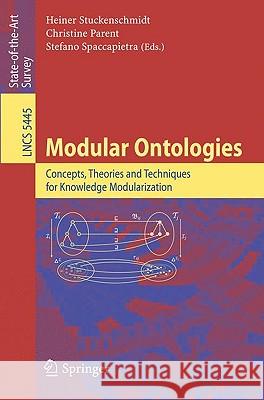Modular Ontologies: Concepts, Theories and Techniques for Knowledge Modularization » książka
Modular Ontologies: Concepts, Theories and Techniques for Knowledge Modularization
ISBN-13: 9783642019067 / Angielski / Miękka / 2009 / 378 str.
The growing emphasis on complexity concerns for ontologies has attracted signi cant interest from both the researchers' and the practitioners' communities in modularization techniques as a way to decrease the complexity of managing huge ontologies.Researchhasproducedmanycomplementaryandcompetingapproaches, mainly with the goal of supportingpractitioners' methodologieswith sound and p- cisely de nedfoundationsand alternatives.Existing prototypessubstantiate research results and experimental evaluations have been performed. Thus, a large body of work is available. This book has been designed to provide the reader with a detailed analysis of where we stand today and which concepts, theories and techniques for knowledge modularization we can con dently rely on. The material for the book has been - lected from research achievements that are mature enough to be considered as a rm and reliable basis on which to inspire further work and to develop solutions in c- crete environments. The content of the book has been organized in three parts. Part I holds a general introductionto theidea andissuescharacterizingmodularization.Thisisfollowedby three chapters that offer an in-depth analysis of properties, criteria and knowledge import techniques for modularization. The last chapter discusses one of the three approaches that implement the modularization idea. The two other approaches are covered in detail in parts II and III.











